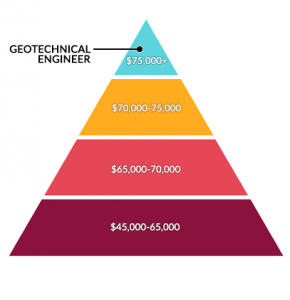8 Easy Facts About Geotheta Explained
Table of ContentsOur Geotheta StatementsSee This Report about GeothetaGeotheta - TruthsThe 5-Minute Rule for GeothetaGet This Report about Geotheta

They carry out website examinations, collect examples, execute laboratory tests, and assess information to evaluate the suitability of the ground for construction projects - Geo Tech Engineering. Based upon their searchings for, geotechnical designers give recommendations for foundation design, slope stability, keeping frameworks, and reduction of geotechnical threats. They collaborate with other professionals, such as designers, structural engineers, and building teams, to make sure that geotechnical factors to consider are integrated into the total task style and execution
By analyzing the behavior and properties of dirt and rock, they can identify possible geotechnical dangers such as landslides, dirt negotiation, or slope instability. Their know-how assists avoid failures or accidents that could jeopardize lives and home. Here are some detailed duties and duties of a geotechnical designer: Site Investigation: Geotechnical designers conduct website investigations to gather information on subsurface conditions.
They interpret the data to comprehend the buildings and actions of the dirt and rock, including their toughness, permeability, compaction features, and groundwater problems. Geotechnical Evaluation and Design: Geotechnical engineers examine the data accumulated during site examinations to assess the stability and suitability of the website for construction projects. They execute geotechnical estimations and modeling to review aspects such as bearing capability, settlement, incline security, lateral planet stress, and groundwater flow.
The Best Guide To Geotheta
Foundation Layout: Geotechnical engineers play a vital role in making structures that can safely sustain the intended framework. They evaluate the dirt problems and tons demands to figure out the appropriate structure type, such as superficial foundations (e.g., grounds), deep foundations (e.g (https://pubhtml5.com/homepage/jugmn/)., stacks), or specialized methods like soil improvement. They consider elements such as settlement restrictions, birthing capacity, and soil-structure communication to establish optimal structure styles
They evaluate construction strategies, screen website tasks, and conduct area assessments to confirm that the design referrals are adhered to. If unexpected geotechnical issues emerge, they examine the circumstance and provide referrals for remediation or changes to the style. Risk Analysis and Mitigation: Geotechnical designers evaluate geotechnical hazards and dangers connected with the job site, such as landslides, liquefaction, or soil disintegration.

Cooperation and Interaction: Geotechnical designers work closely with other specialists involved in a task, such as designers, structural designers, and building and construction teams. Reliable communication and cooperation are important to integrate geotechnical factors to consider into the total project layout and building procedure. Geotechnical designers provide technological experience, response questions, and guarantee that geotechnical needs are met.
Geotheta Fundamentals Explained
Here are some kinds of geotechnical engineers: Structure Designer: Structure designers specialize in developing and evaluating structures for structures. They examine the dirt problems, lots needs, and website qualities to figure out one of home the most ideal foundation type and design, such as shallow structures, deep foundations, or specialized methods like pile structures.
They review the variables affecting incline security, such as dirt residential or commercial properties, groundwater problems, and incline geometry, and create approaches to prevent slope failings and minimize dangers. Earthquake Engineer: Earthquake engineers specialize in analyzing and designing structures to withstand seismic pressures. They analyze the seismic danger of a website, assess soil liquefaction possibility, and establish seismic style criteria to ensure the safety and security and strength of structures during quakes.
They execute area testing, collect examples, and examine the gathered information to characterize the soil buildings, geologic developments, and groundwater problems at a site. Geotechnical Instrumentation Engineer: Geotechnical instrumentation engineers concentrate on monitoring and gauging the habits of soil, rock, and frameworks. They set up and maintain instrumentation systems that check aspects such as soil negotiation, groundwater levels, slope movements, and architectural displacements to analyze performance and give early warnings of prospective issues.
The Ultimate Guide To Geotheta
They conduct examinations such as triaxial examinations, loan consolidation tests, direct shear examinations, and leaks in the structure tests to gather data for geotechnical evaluation and layout. Geosynthetics Engineer: Geosynthetics engineers concentrate on the design and application of geosynthetic materials, such as geotextiles, geogrids, and geomembranes. They utilize these products to boost soil stability, enhance inclines, provide drain remedies, and control disintegration.
They tend to be investigatory individuals, which means they're intellectual, introspective, and inquisitive. They are curious, methodical, rational, logical, and sensible. Some of them are additionally social, indicating they're kind, generous, participating, individual, caring, practical, understanding, skillful, and pleasant - Consulting Engineers.
In the office environment, geotechnical designers use specialized software application tools to perform computations, produce designs, and assess information. They prepare records, evaluation project specifications, connect with clients and team participants, and coordinate job activities. The office setup offers a conducive setting for research, evaluation, and partnership with other specialists included in the project.
The Only Guide for Geotheta
They regularly check out job websites to conduct site examinations, assess geotechnical problems, and gather data for analysis. These visits involve traveling to various areas, often in remote or difficult surfaces. Geotechnical engineers may carry out dirt tasting, conduct examinations, and screen building and construction tasks to guarantee that the geotechnical aspects of the project are being implemented appropriately.
Geotechnical engineers likewise work in specialized geotechnical labs. In these facilities, they conduct experiments, do examinations on soil and rock samples, and assess the engineering residential or commercial properties of the materials. Geotechnical lab designers function thoroughly in these environments, managing screening equipment, operating instruments, and videotaping information. They collaborate with other lab personnel to make certain exact and trusted testing outcomes.